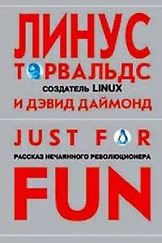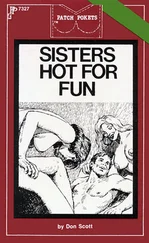Linus Torvalds - Just for Fun
Здесь есть возможность читать онлайн «Linus Torvalds - Just for Fun» весь текст электронной книги совершенно бесплатно (целиком полную версию без сокращений). В некоторых случаях можно слушать аудио, скачать через торрент в формате fb2 и присутствует краткое содержание. Город: NewYork, Год выпуска: 2001, ISBN: 2001, Издательство: HarperCollins Publishers, lnc., Жанр: Программирование, на английском языке. Описание произведения, (предисловие) а так же отзывы посетителей доступны на портале библиотеки ЛибКат.
- Название:Just for Fun
- Автор:
- Издательство:HarperCollins Publishers, lnc.
- Жанр:
- Год:2001
- Город:NewYork
- ISBN:0-06-662072-4
- Рейтинг книги:4 / 5. Голосов: 2
-
Избранное:Добавить в избранное
- Отзывы:
-
Ваша оценка:
- 80
- 1
- 2
- 3
- 4
- 5
Just for Fun: краткое содержание, описание и аннотация
Предлагаем к чтению аннотацию, описание, краткое содержание или предисловие (зависит от того, что написал сам автор книги «Just for Fun»). Если вы не нашли необходимую информацию о книге — напишите в комментариях, мы постараемся отыскать её.
Just for Fun — читать онлайн бесплатно полную книгу (весь текст) целиком
Ниже представлен текст книги, разбитый по страницам. Система сохранения места последней прочитанной страницы, позволяет с удобством читать онлайн бесплатно книгу «Just for Fun», без необходимости каждый раз заново искать на чём Вы остановились. Поставьте закладку, и сможете в любой момент перейти на страницу, на которой закончили чтение.
Интервал:
Закладка:
I literally slept on it. Actually, it wasn't much of a sleep. I lay in bed thinking about Transmeta's plans. Then I started fantasizing about having a backyard palm tree. Then I started ruminating over what I had seen on the simulator. It was a memorable, fitful night, but nothing like the frostbitten anxiety of Ede.
By morning, I was somewhat excited. By the end of the second day, I was very excited. That's when the stress began.
Before accepting Transmeta's offer, I talked it over with various people. When word got out that I was considering the job, I received a number of other offers. In Finland I got an offer from Tele, which was using Linux in some capacity. Through Maddog I got an offer at Digital. (No offense, but Boston in winter isn't a whole lot better than Helsinki in winter. Okay, maybe it is.) I talked to some of the Red Hat people. They offered me a job and said they would pay better than Transmeta was paying, even though they had no idea what the proposed {2} 2 Printed book says "poposed", which is likely a typo: changed to "proposed".
salary was because I hadn't even discussed money with the company. The Red Hat crowd said they would even top Transmeta's stock options, whatever they would be. But I wasn't interested in working for any particular Linux company -- even one that was fortunate enough to be located in the middle of North Carolina.
In the end, I got five job offers without ever formally looking for a job. Transmeta's was the most exciting, by far.
I said yes. It felt weird. The next thing I did was tell the university I would be leaving. That's when the stress really began. For me, it was a giant step that meant there was no turning back. We were having a new child, moving to a new country, and I was leaving the safe nest of the University of Helsinki -- but first I had to write my thesis. In retrospect, I guess getting all those changes over at once was a good idea. But it was madness.
There was no formal announcement (why should there be?). Just word circulating on the Internet, and the aforementioned debate about whether I would be able to remain true to Linux and free software in the evil corporate environment, and between the changing of diapers. Back then, people had this view of Linux as something that was mainly developed by university students, not settled-down people. I guess it was understandable that they would be nervous.
I wrote my thesis over a long weekend and turned it in minutes before taking Tove to the hospital to deliver Patricia, who was born forty hours later. That was December 5th, 1996. Being a father seemed like the most natural thing in the world.
The next several weeks we were busy with Patricia and constantly worrying about obtaining the approvals for our U.S. visa paperwork, which was taking forever. We figured it would help if we were married, so sometime in January -- I always have to ask Tove the date -- we went to a government office to be officially wed.
We had three guests: Tove's parents and my mother. (My dad was in Moscow). It was a strange time. At some point we shipped most of our belongings to the United States without knowing when we would be able to fly out. To say good-bye to all of our friends, we hosted a house cooling party, the reverse of a housewarming. Twenty people crammed into the small, recently emptied one-bedroom apartment. In good Finnish tradition, everybody got drunk.
Our visas finally arrived and on February 17, 1997, we boarded a morning flight to San Francisco. I remember the temperature in Helsinki: 0 degrees Fahrenheit. I remember Tove's family at the airport, crying when we said good-bye -- they're very close. I don't remember if my family was there or not. They must have been. Or maybe not.
We landed in the United States and made our way through customs carrying a baby and two cats. Peter Anvin was there to greet us as we rented a car for the drive down to Santa Clara, to the apartment complex we had chosen during an apartment-hunting trip we had taken a few months earlier. It all felt surreal, particularly the 70-degree difference in climate from Finland.
Our belongings wouldn't arrive for another two months. We spent the first night sleeping on an air mattress we had brought with us. The next day we went out to buy a real bed. Until our furniture made it to California, Patricia had to sleep in her carriage. It was something that really annoyed Tove, although David points out that it is sort of cyclical, referring to the first three months of my life that were spent in a laundry basket. We didn't do much cooking (we still don't) and didn't know where to go for dinner. We ate most of our meals either at the food court of a local shopping mall or at a fast-food place. I remember telling Tove we had to find some new places to eat.
With the move and getting accustomed to the new job at Transmeta, I didn't have a lot of time to devote to Linux during those first couple of months. The new job occupied much of my time and my after-work hours were spent with Tove and Patricia, trying to get to know the new area. It was a fairly busy time. We had absolutely no money. I had this great salary, but everything went toward getting furniture. Buying our cars was a hassle because we had no way of establishing a credit history. We even endured hassles proving we were capable of paying for telephone service.
My computer was on a ship that was inching its way around the Horn of Africa. It was the first period of time when I was quiet on the Web, and my absence worried a lot of people. It was like, Okay, now he's working for a commercial company....
Many people asked outright: Does this mean Linux will die off as a free system? I explained that under my agreement with Transmeta I could continue doing Linux. And that I wasn't going to go away. (I couldn't think of a way to say that I was just catching my breath.)
Life in Transmetaland.
One of the problems with explaining to people how the move to the States and into the commercial world wasn't going to change me was the fact that Transmeta was just about the most secretive company around. There was only one rule concerning what you could talk about, and that rule was very simple: "Say nothing." Which just made Linux people sometimes wonder what kind of strange cult I had joined, and whether I was ever coming back. I couldn't even tell my mother what I was up to -- not that she would have been interested.
What I was doing at Transmeta wasn't all that strange. The first thing I actually ended up doing was fixing some of the Linux problems that Transmeta had. The company was using a lot of multiprocessor Linux machines. I had never personally worked on the Linux SMP (Symmetric MultiProcessing) issues, and it turned out that many things didn't really work the way they were supposed to. I took this as a personal affront, and had to fix it, of course.
But my real work was actually being part of the Transmeta softball team.
Oh, I mean software team. We didn't play all that much softball. None of the Silicon Valley leagues would let us join unless we agreed to tell them what we were up to.
I don't know how familiar people are with Transmeta. As I'm typing this, we're actually in our silent period before the (please, God, buy our stock) IPO, and we're no longer secret, although we're back in our stealth mode due to SEC rules about initial public offerings. Let's hope that by the time this book is out, everybody and his dog has heard about Transmeta and bought (subliminal message: STOCK) one or more of our CPUs. Because that's what Transmeta does -- CPU's. Hardware.
But Transmeta does more than just hardware. Which is just as well because, quite frankly, I wouldn't know a transistor from a diode even if one kicked me in the head. What Transmeta does is simple hardware that relies on clever software to make a simple CPU look like much more than it really is -- like a standard Intel-compatible X86, in fact. And with the hardware being made smaller and simpler, the CPU ends up having fewer transistors, which in turn makes it use less power, which as everybody realizes will become increasingly more important in a mobile world. This clever software is why Transmeta has a rather large software team, and why I was there.
Читать дальшеИнтервал:
Закладка:
Похожие книги на «Just for Fun»
Представляем Вашему вниманию похожие книги на «Just for Fun» списком для выбора. Мы отобрали схожую по названию и смыслу литературу в надежде предоставить читателям больше вариантов отыскать новые, интересные, ещё непрочитанные произведения.
Обсуждение, отзывы о книге «Just for Fun» и просто собственные мнения читателей. Оставьте ваши комментарии, напишите, что Вы думаете о произведении, его смысле или главных героях. Укажите что конкретно понравилось, а что нет, и почему Вы так считаете.












